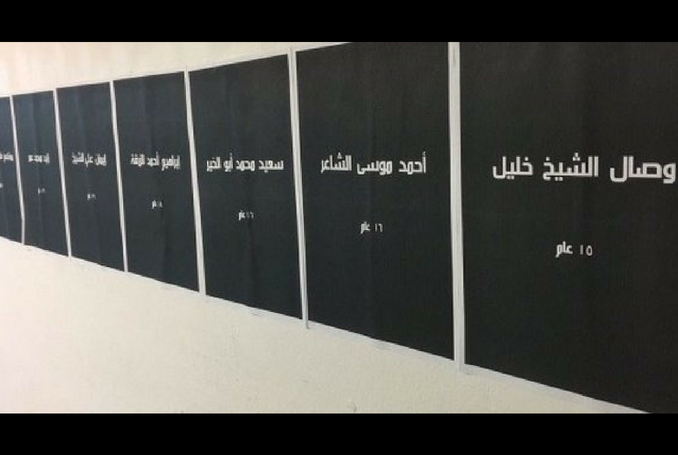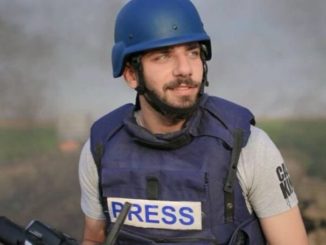
By Or Amit
Every person has a name, wrote the Israeli poet Zelda, thereby coining a phrase that has become a mainstay of the Israeli pathos. The poem’s title is also the motto of Yad Vashem’s Every Person Has a Name database, which aims to catalog the names of all six million Jews murdered in the Holocaust.
It is a noble project, and vital: six million is a mere number, and no one feels sorry for a number. A name conveys an identity, individuality, a nucleus of a life story. My great-grandfather is listed there. This makes him not merely one in six million but a man with a name, a date of birth, an identity. A human being who has lived and died. A person.
Some Palestinians have got it into their heads that they, too, are humans whose dead are entitled to a name. In the wake of the massacre of sixty unarmed Palestinian protesters on May 14, a student at Jerusalem’s Bezalel Academy of Arts and Design put the names and ages of the dead Palestinians in Arabic script on black plaques and mounted them on one of Bezalel’s walls. It was a small-scale Palestinian version of Every Person Has a Name.
The exhibit doesn’t glorify the dead Palestinians; it doesn’t take sides; it doesn’t accuse the Israeli military of wrongdoing. It merely gives the names and ages of those who’ve died, but that was enough to incense a gaggle of Israeli right-wing bullies, for whom any acknowledgment of an iota of humanity in Palestinians crosses a red line.
Jerusalem Mayor Nir Barkat, a noted humanitarian, posted an angry tweet protesting the sacrilegious exhibit (all translations mine):
“I was shocked to see hung on the walls of Bezalel the names of the terrorists who were harmed while trying to breach the Gaza border fence in order to kill Jews. There is a limit and a clear red line to the cynical use of freedom of speech. I have contacted Bezalel’s administration and demanded that these plaques be removed immediately and that these provocations be prohibited!”
Mr. Barkat would do well to pen a style manual elucidating the proper reference to a dead Palestinian. Since a name won’t do, perhaps it, or that thing, or just a grunt accompanied by an innovative hand gesture would suffice.
Speaker of the Knesset Yuli Edelstein also chimed in. The man who served three years in a Soviet gulag hasn’t learned any important lessons about dehumanization during his tenure there, as is evident by this avuncular advice:
I hold freedom of expression to be a cardinal value, but a person and an artist must know how to set self-imposed limits. I suggest that the self-proclaimed protest artists remember that our soldiers on the Gaza Strip border are defending them as well.
Yoav Kish, a Likud Member of Knesset, had this to say:
“This time, the students chose to be creative by demeaning values. They confused freedom of expression with basic morality. Even offenses against morality and common sense must have limits, and unfortunately, the students have crossed that line.”
Ofir Akunis, Israel’s Minister of Science, Technology, and Space, opined as well:
“I am always for freedom of speech and creativity but I will not allow the freedom to demean.”
Demean whom? How can naming a dead person be demeaning to anyone? Akunis continues:
“Even Hamas announced that the casualties in the Gaza border are his operatives, that is, terrorists.”
The syllogism is clear: members of Hamas are terrorists; terrorists (whatever this means to an Israeli right-winger) are subhumans who are not to be named; therefore, members of Hamas are subhumans who are not to be named. QED.
But let us not mock these distinguished statesmen. Far from impetuous children, they are, in fact, clever strategists who understand that dehumanization facilitates long-term oppression, subjugation, and disenfranchisement of large populations. Akunis, Barkat et al. understand what the Nazis and the Japanese ravishers of Nanking knew, viz., that genocide and depredation come much more easily when the victims are dehumanized, degraded, looked upon as subhuman vermin.
Israeli leaders know that their soldiers would be chary to gun down unarmed Palestinians if they viewed them as humans with names, with families, and with identities, so any attempt to provide the victims such identities must be fought.
In order to facilitate their wholesale slaughter, the Palestinians must be viewed as a block, an organic whole, a chunk of living matter—thepalestinians—rather than as Ali the student or Zaynab the midwife. Whatever falls off that block of Gazans is sawdust, and no reasonable person names particles of dust.
Note also that this hoedown of right-wing bellyaching is a response to a response to a one-sided massacre in which at least sixty Palestinians were killed, about 1,360 were shot—not shot at, but actually hit!—by live ammunition and not one Israeli soldier was wounded or killed. So, even the hackneyed gripe about the hurt feelings of deceased soldiers’ families is moot. This is not about protecting the feelings of Israelis; this is about effacing the Palestinians.
Many years ago there was an ill-fated campaign by right-wingers to do away with the term ‘Palestinian People’. Using the term ‘Palestinian’ suggests that a certain group of non-Jews has some legitimate claim to certain parts of the Holy Land. Stop saying ‘Palestinian’, and maybe those ‘Arabs’ will go elsewhere—anywhere where Arabic is spoken. The campaign was a bust, and nowadays even right-wingers use the term ‘Palestinian’, at least when the cameras are on.
Except that this campaign hasn’t evaporated; it merely shifted its focus from the first word to the second, from ‘Palestinian’ to ‘People’. Stop referring to those things as ‘people’ with names, and then see how easy it is to gun thousands of them down and still make it home in time for Master Chef.
Israeli right-wingers go nuts when you compare them to Nazis. Let us then be gracious to Messrs. Akunis, Kish, Edelstein and Barkat: they are not Nazis; they merely think like Nazis.
– Or Amit is a freelance writer living in Dresden, Germany. He contributed this article to PalestineChronicle.com.







